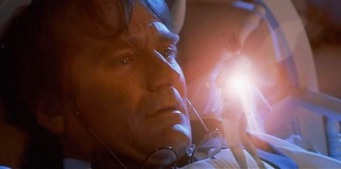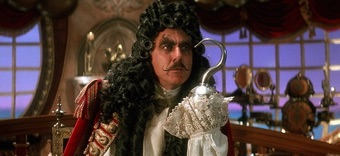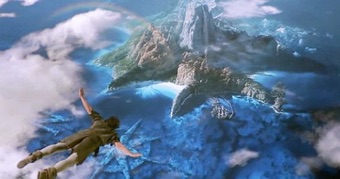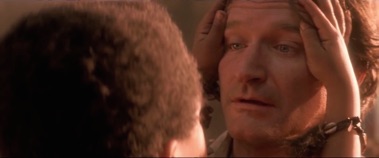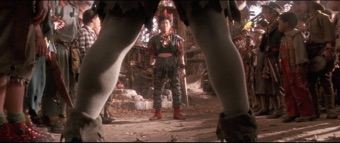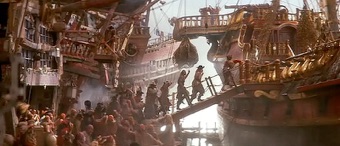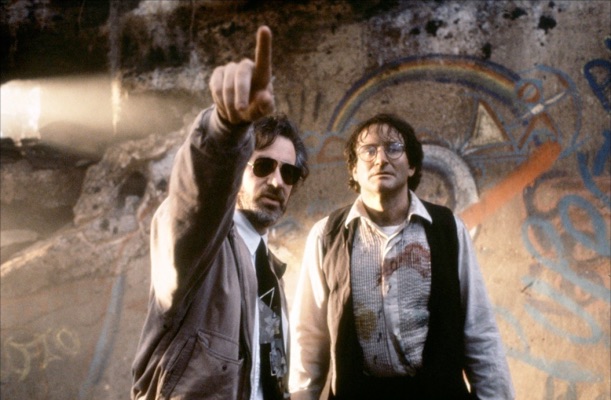It took me a while to warm to Spielberg’s Hook, hence it took me a few months after the film’s Christmas 1991 debut to get around to writing my review for the Spielberg Film Society, newsletter #47. 25 years later, the film has gained quite a following, perhaps from people a bit younger than me who take delight in yelling ‘Bangarang!’ I know the film gained added poignancy after Robin Williams’ death, and I’ve grown fond of John Williams’ magnificent score. So opinions change, and even little Charlie Korsmo is now apparently a lawyer. But here’s my slightly snarky, somewhat tardy appreciation from 1992.
Finally, Hook!
by Joe Fordham (August 1992)
Six months after its initial release, after viewing the movie twice, once amidst great hoopla and Christmas ballyhoo at the Cinerama Dome in Hollywood, and a second time a few weeks later at the local AMC, this bewildered, dazzled, but somewhat disappointed critic is only just beginning to form a clear aid totally subjective opinion of Steven Spielberg's Hook.
It's a Christmas movie, right? A Christmas where jolly old London town is deep in snow (which it rarely ever is), with little kids in Granny Wendy’s warm and cosy nursery. Granny Wendy...? Uncle Tootles...? Robin Williams as Peter Banning? Peter? Peter Who? This is the
J.M. Barrie original re-imagined, with sly affection and tongue-in-cheek. Did you notice Mrs. Spielberg in the wings prompting the kiddies at the pre-school Christmas play? It's the first scene of the movie, the play within the play. We watch the faces watching,
enfants verité, Spielberg's trademark percolated down a generation from
The 400 Blows. It puts us in familiar territory and teases expectations from frame one. A small scale to start off, the spectacle is to come. Eventually.
Problem number one: There's a lot of setting-up to do, a lot of little details that at first might seem irrelevant but are all there to pave the way to the moment we've all paid $7.50 to see, when Peter Pan returns to Neverland. Spielberg and accredited screenwriters Jim Hart, Nick Castle and Malia Scotch Marmo all spend a deal of time weaving their web to suspend our fabled disbelief.
Did Peter Banning really step from the dusty pages of Granny Wendy's bedtime storybook?
Is Granny Wendy an ersatz Alice Hargreaves, a flesh and blood little girl caught somewhere between real life and a fairy tale written for her? Could this explain why Robin Williams’ Banning is so screwed up? Does he dream all that follows in an alcoholic daze? Right up until the end, the movie lets us take it whichever way we want it, a particularly poetic cinematic moment being when the sky and clouds of Neverland magically become designs in Granny Wendy's wallpaper, although we are later thrown a curve with an inexcusable act of levitation by Tootles (control yourself, man).
But let's not quibble. This is a huge movie, and a fantasy to boot. Fantasies rarely make much money, a great deal of their success, artistic or box office, always coming down to taste. Spielberg has more than proved his ability to cinematically enchant, so no surprise he was finally given a shot at working out his long-promised
Peter Pan project. Perhaps it was
this great feeling of anticipation that pumped up critical expectations, so much so that it was forgotten that Peter Pan was a children's story. This is a kid's film, more so than any film Spielberg has directed. It's a rich and sticky Christmas cake packed with fruit and nuts and cherries, some might say with too such marzipan and icing. Personally, I can be easily tempted by Christmas cake, particularly the old English Victorian type, with a good three-quarter inches of royal icing. However, it is easy to overindulge and regret the consequences. This is the closest I can equate my own critical appreciation of this movie.
Hook has great heart, you must admit, even if you can't abide the Lost Boy tree house skateboard park (I hated that), or even if the little kids (with the exception of Charlie Korsmo) did include some of the brattiest Hollywood brats Spielberg ever wrangled.
But interspersed with all the hijinks are scenes of great beauty and quite surreal and unforgettable power,
such as the scene where the little Lost Boy sculpts a smile into Robin Williams' face and recognizes Pan. It's unsettling, disturbing, and then just incredible, thanks to the music of John Williams -- compare this to the kiddie mimic scene in
Jaws, and the 'I can bring them back' scene in
Empire of the Sun, and it is an intriguing Spielbergian evolution.
Another moment that stands out is where the penny drops for Peter, where he remembers his childhood and learns how to fly. I cannot believe some critics found this sequence overlong and unnecessary. It is the beating heart of the story! It creeps up unexpectedly, then explodes across the screen with the velocity and exhilaration of a flying dream. Finally, we are airborne... and another image has been laid out for Peter to confront when he returns to reality via the window of Granny Wendy's nursery. Clever plotting once again, and a hell of a payoff to the story's main psychological plot point: Peter finds his happy thought! We
knew he would, but who could have guessed it would have this impact?
Other notable surprises include Hoffman's hilarious, vain, pathetic, and suicidal Hook; Julia Roberts’ Tink, finally, briefly reaching an epiphany with her unrequited love for Peter; and the other often-overlooked Spielberg trademark: faultless, understated performances form the main supporting actors, particularly Maggie Smith as Granny Wendy, and Caroline Goodall as her beguiling, long-suffering daughter, Moira. Robin Williams remains Robin Williams, stand-up comic, but his heart is in it.
Spielberg has only once before attempted an almost-totally studio-bound movie,
1941. This movie also suffered from a surfeit of invention and a sense of claustrophobia. Everything you see has been constructed; made for the movie. That is why it is such an unrelenting
eyeful, something hyperactive kids might jam on, but something the average mono-reality carbon-based lifeform might find hard to digest. Roman Polanski met the same fate with his similarly, salty-seadog epic
Pirates.
Hook falters mostly in its pacing (top-heavy in the beginning, disjointed in the climax) and in playing to the gallery (perhaps because Spielberg is now a father) but Spielberg betters both Polanski’s film and his own earlier
1941.
Hook is a very sweet idea with literary roots. It is Barrie redefined, Pan no longer puckish, transformed to the common man. Spielberg never mocks or dispels the fairy tale, he plays with the old ideas, casting Bob Hoskins as Smee and as the park keeper in Kensington Gardens, toward the end of the film, where he is seen sweeping up the beer bottles around Peter who has fallen back to earth at the foot of the J.M. Barrie monument statue of Peter Pan. It's a lovely moment, everything comes full circle -- and was that really Tink or just the morning sun reflecting off the dew? If fairy tales today are fragile and outdated, Spielberg brings them new reality. That is something worthwhile.
Imagery © TriStar Pictures
article reprinted with permission, SSFS © August 1992
ISSN 0883-6094
